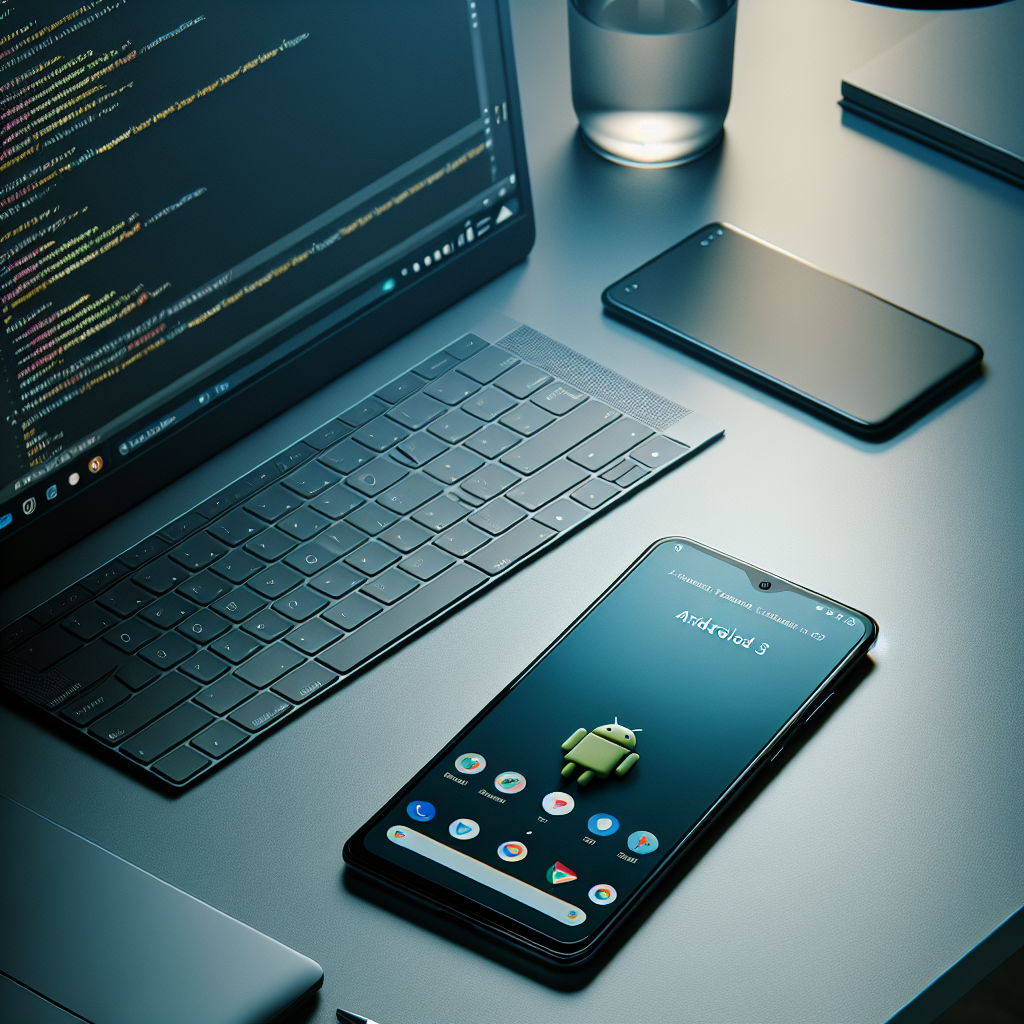How to Develop a Native Android App: A Step-by-Step Guide
Developing a native Android app involves creating software specifically designed to run on Android devices, using the Android operating system’s native tools and capabilities. Unlike cross-platform apps, which are designed to work across multiple platforms, native apps are built to take full advantage of the features and performance of the Android OS. This specificity allows developers to utilize hardware and software features like camera, GPS, and notifications more effectively, resulting in a smoother and more efficient user experience.
For businesses and developers alike, understanding the intricacies of how to develop native Android apps is crucial. With the Android market share continuing to grow, having a well-designed and functional app can set you apart from the competition. By focusing on native development, you ensure that your app is optimized for performance, security, and user engagement.
Ready to take the next step in your app development journey? Get a free quote from NS804, experts in native mobile app development, and bring your vision to life.
Setting Up Your Development Environment

The first step in learning how to develop a native Android app is setting up your development environment. This process involves installing the necessary tools and software that will enable you to build and test your app effectively.
Begin by downloading and installing Android Studio, the official integrated development environment (IDE) for Android development. Android Studio provides a comprehensive suite of tools, including a code editor, a visual layout editor, and an Android emulator, which allows you to test your app on different virtual devices.
Once Android Studio is installed, you will need to install the Java Development Kit (JDK). Java is the primary programming language used for Android development, so having the latest version of the JDK is essential. You can configure Android Studio to use the JDK by navigating to the project structure settings within the IDE.
Next, set up the Android SDK (Software Development Kit). The SDK includes various tools, libraries, and APIs necessary for building and testing Android apps. Android Studio typically manages the SDK setup for you, but you can customize the SDK components based on your project’s requirements.
Finally, configure an Android Virtual Device (AVD) within Android Studio. An AVD simulates an Android device on your computer, allowing you to test your app’s functionality and performance without needing a physical device. You can create multiple AVDs to test your app on different screen sizes and Android versions.
With your development environment set up, you’re ready to dive into coding and start building your native Android app. Properly setting up your tools ensures a smoother development process and helps you avoid common pitfalls and issues down the line.
Understanding Android App Architecture

To master how to develop a native Android app, it’s crucial to understand the underlying architecture. Android app architecture is a structural design that guides the development process, ensuring that your app is scalable, maintainable, and testable.
At the core of Android app architecture is the Model-View-ViewModel (MVVM) pattern. This pattern helps to separate the app’s data (Model) from its UI (View), with the ViewModel acting as an intermediary. The Model holds the business logic and data, the View displays the data and interacts with the user, and the ViewModel handles the communication between the Model and the View.
Another key component is Activities and Fragments. An Activity is a single, focused task that the user can perform, such as a login screen or a settings page. Fragments are modular sections of an Activity, allowing for more flexible and reusable UI components. Together, they form the building blocks of your app’s user interface.
Understanding Intents and Services is also essential. Intents are messaging objects used to request actions from other app components or even other apps. Services, on the other hand, perform long-running operations in the background, such as downloading files or playing music. They ensure that your app remains responsive and efficient.
Finally, you need to be aware of Android Jetpack, a suite of libraries, tools, and guidance provided by Google to help you build robust Android apps. Jetpack components such as LiveData, Room, and Navigation are designed to work together seamlessly, reducing boilerplate code and simplifying complex tasks.
By grasping these architectural principles, you’ll be better equipped to create high-quality, efficient, and maintainable Android apps. A solid understanding of Android app architecture lays the foundation for successful app development, enabling you to tackle more advanced topics with confidence.
Writing Your First Android App Code

Once you have a firm grasp of how to develop a native Android app and understand its architecture, it’s time to dive into writing your first lines of code. This step is crucial as it sets the groundwork for your entire application.
Begin by setting up your development environment using Android Studio, the official Integrated Development Environment (IDE) for Android development. Android Studio provides a comprehensive suite of tools to streamline your coding experience. After installation, you’ll need to create a new project. Choose a project template that suits your needs, such as an empty activity or a basic activity with a layout file.
Next, you’ll encounter the MainActivity.java (or MainActivity.kt for Kotlin) file. This file serves as the entry point for your application. It extends the AppCompatActivity class and overrides the onCreate() method. Within this method, you will set up your user interface by linking the activity to its XML layout file using setContentView(R.layout.activity_main).
To create a basic user interface, navigate to the res/layout/activity_main.xml file. This XML file defines the layout of your activity. You can use various UI components like TextView, Button, and EditText by adding their XML tags within a layout container such as LinearLayout or ConstraintLayout. For instance:
<LinearLayout xmlns:android="http://schemas.android.com/apk/res/android"
android:layout_width="match_parent"
android:layout_height="match_parent"
android:orientation="vertical">
<TextView
android:id="@+id/textView"
android:layout_width="wrap_content"
android:layout_height="wrap_content"
android:text="Hello, World!" />
<Button
android:id="@+id/button"
android:layout_width="wrap_content"
android:layout_height="wrap_content"
android:text="Click Me" />
</LinearLayout>With the UI components defined, you can now handle user interactions in the MainActivity file. For example, to respond to a button click, you can set an OnClickListener within the onCreate() method:
Button button = findViewById(R.id.button);
button.setOnClickListener(new View.OnClickListener() {
@Override
public void onClick(View v) {
TextView textView = findViewById(R.id.textView);
textView.setText("Button Clicked!");
}
});Writing your first Android app code may seem daunting at first, but with practice, it becomes second nature. The key is to start simple, gradually incorporating more complex features as you grow more confident in your coding abilities.
Testing and Debugging Your Android App

After writing your first lines of code, the next critical step in how to develop a native Android app is to rigorously test and debug your application. Ensuring that your app runs smoothly and is free of bugs is essential for a positive user experience.
Begin by using the built-in testing tools provided by Android Studio. One of the most powerful tools at your disposal is the Android Emulator. This emulator allows you to simulate a wide range of devices and Android versions, enabling you to test your app’s performance across different environments. Start by setting up virtual devices that mimic the hardware and software specifications of your target audience.
Unit testing is an integral part of the development process. In Android development, you can use frameworks like JUnit to write and run unit tests. These tests help verify that individual components of your app work as expected. For example, you can create a unit test for a function that calculates the sum of two numbers:
public class CalculatorTest {
@Test
public void addition_isCorrect() {
assertEquals(4, Calculator.add(2, 2));
}
}For UI testing, consider using Espresso, a framework that allows you to write automated tests for your app’s user interface. Espresso tests interact with UI components and verify their behavior. Here’s an example of an Espresso test that checks if a button click updates a TextView:
@Test
public void buttonClick_updatesTextView() {
onView(withId(R.id.button)).perform(click());
onView(withId(R.id.textView)).check(matches(withText("Button Clicked!")));
}Debugging is another crucial aspect of app development. Android Studio offers a comprehensive debugger that allows you to set breakpoints, inspect variables, and step through your code line by line. This helps identify and resolve issues more efficiently. Additionally, the Logcat tool provides real-time logging of your app’s behavior, helping you track down and fix runtime errors.
Remember to also test your app on physical devices. Emulators are great for initial testing, but they can’t replicate the exact performance characteristics of real hardware. Testing on actual devices ensures that your app performs well in real-world scenarios.
By incorporating thorough testing and debugging practices, you can significantly improve the quality and reliability of your native Android app, paving the way for a successful launch.
Deploying and Updating Your Android App
After thorough testing and debugging, the next step in how to develop a native Android app is deploying and updating your application. Deployment is the process of making your app available to users, typically through the Google Play Store.
To start, you’ll need to create a developer account on the Google Play Console. This platform provides all the tools necessary for publishing and managing your app. Once your account is set up, you can begin by preparing your app for release. This involves generating a signed APK or Android App Bundle, which is a package file format used for distributing and installing apps.
Follow these steps to generate a signed APK in Android Studio:
- In Android Studio, go to Build > Generate Signed Bundle / APK.
- Select either Android App Bundle or APK and click Next.
- Choose an existing key or create a new one to sign your app.
- Follow the prompts to complete the process and generate the signed APK or App Bundle.
Once you have your signed APK or App Bundle, you can upload it to the Google Play Console. Here, you’ll also need to provide important details about your app, such as its title, description, screenshots, and promotional graphics. Additionally, it’s crucial to set the appropriate app permissions and adhere to Google’s policies to ensure a smooth review process.
After submitting your app, Google will review it to ensure it meets their guidelines. Once approved, your app will be available for download on the Google Play Store. But the process doesn’t end there. Regular updates are vital to maintain user engagement and satisfaction.
To update your app, you’ll need to follow a similar process: generate a new signed APK or App Bundle with the latest changes, and then upload it to the Google Play Console. Make sure to provide clear release notes that inform users about the new features, improvements, or bug fixes included in the update.
Effective deployment and consistent updates are key to the success of your native Android app. By ensuring a smooth launch and keeping your app up-to-date, you can build a loyal user base and achieve long-term success.
Ready to bring your app idea to life? Get a free quote from our expert team at NS804 today!












